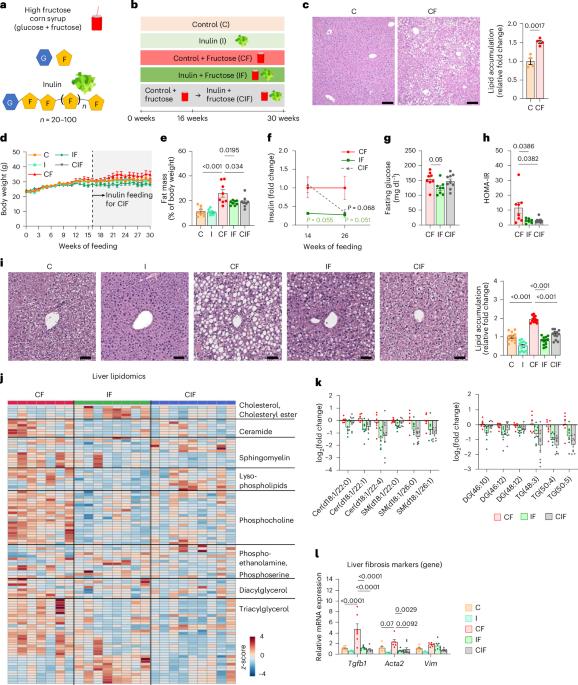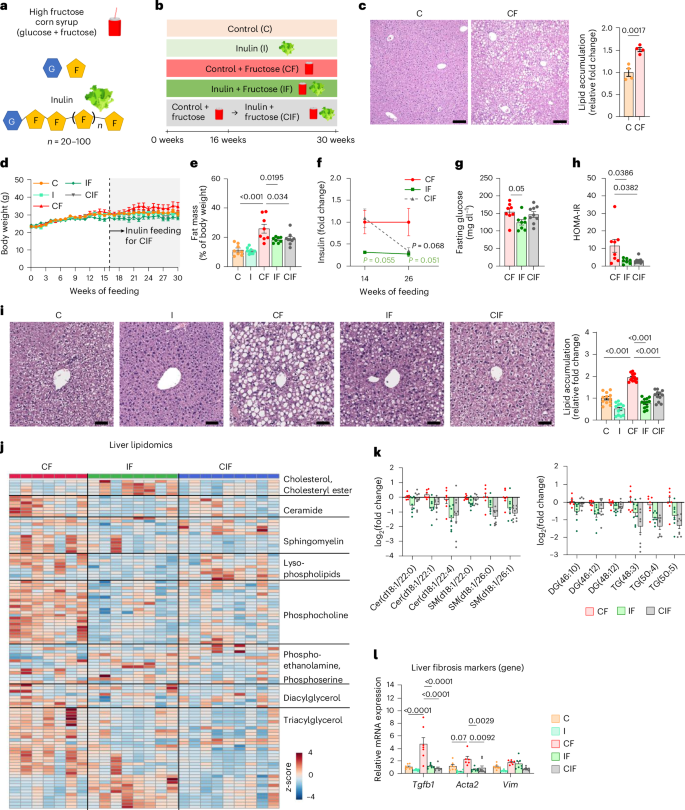Dietary fibre-adapted gut microbiome clears dietary fructose and reverses hepatic steatosis
IF 20.8
1区 医学
Q1 ENDOCRINOLOGY & METABOLISM
引用次数: 0
Abstract
Excessive consumption of the simple sugar fructose, which induces excessive hepatic lipogenesis and gut dysbiosis, is a risk factor for cardiometabolic diseases. Here we show in male mice that the gut microbiome, when adapted to dietary fibre inulin, catabolizes dietary fructose and mitigates or reverses insulin resistance, hepatic steatosis and fibrosis. Specifically, inulin supplementation, without affecting the host’s small intestinal fructose catabolism, promotes the small intestinal microbiome to break down incoming fructose, thereby decreasing hepatic lipogenesis and fructose spillover to the colonic microbiome. Inulin also activates hepatic de novo serine synthesis and cystine uptake, augmenting glutathione production and protecting the liver from fructose-induced lipid peroxidation. These multi-modal effects of inulin are transmittable by the gut microbiome, where Bacteroides acidifaciens acts as a key player. Thus, the gut microbiome, adapted to use inulin (a fructose polymer), efficiently catabolizes dietary monomeric fructose, thereby protecting the host. These findings provide a mechanism for how fibre can facilitate the gut microbiome to mitigate the host’s exposure to harmful nutrients and disease progression. The dietary fibre inulin is shown to promote fructose catabolism by the small intestinal microbiome, thereby mitigating fructose-induced hepatic lipogenesis and steatosis.


膳食纤维适应肠道微生物群清除膳食果糖并逆转肝脂肪变性
过量摄入单糖果糖会导致肝脏脂肪生成过多和肠道生态失调,是心脏代谢疾病的危险因素。在这里,我们在雄性小鼠中发现,当肠道微生物群适应膳食纤维菊粉时,可以分解膳食果糖,减轻或逆转胰岛素抵抗、肝脂肪变性和纤维化。具体来说,菊粉的补充在不影响宿主小肠果糖分解代谢的情况下,促进小肠微生物群分解传入的果糖,从而减少肝脏脂肪生成和果糖向结肠微生物群的溢出。菊粉还激活肝脏从头合成丝氨酸和胱氨酸摄取,增加谷胱甘肽的产生,保护肝脏免受果糖诱导的脂质过氧化。菊粉的这些多模式效应可通过肠道微生物群传播,其中酸化拟杆菌起着关键作用。因此,肠道微生物群,适应使用菊粉(一种果糖聚合物),有效地分解膳食单体果糖,从而保护宿主。这些发现为纤维如何促进肠道微生物群减轻宿主对有害营养物质的暴露和疾病进展提供了一种机制。
本文章由计算机程序翻译,如有差异,请以英文原文为准。
求助全文
约1分钟内获得全文
求助全文
来源期刊

Nature metabolism
ENDOCRINOLOGY & METABOLISM-
CiteScore
27.50
自引率
2.40%
发文量
170
期刊介绍:
Nature Metabolism is a peer-reviewed scientific journal that covers a broad range of topics in metabolism research. It aims to advance the understanding of metabolic and homeostatic processes at a cellular and physiological level. The journal publishes research from various fields, including fundamental cell biology, basic biomedical and translational research, and integrative physiology. It focuses on how cellular metabolism affects cellular function, the physiology and homeostasis of organs and tissues, and the regulation of organismal energy homeostasis. It also investigates the molecular pathophysiology of metabolic diseases such as diabetes and obesity, as well as their treatment. Nature Metabolism follows the standards of other Nature-branded journals, with a dedicated team of professional editors, rigorous peer-review process, high standards of copy-editing and production, swift publication, and editorial independence. The journal has a high impact factor, has a certain influence in the international area, and is deeply concerned and cited by the majority of scholars.
 求助内容:
求助内容: 应助结果提醒方式:
应助结果提醒方式:


